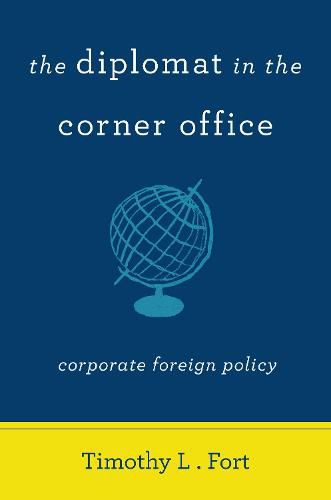Readings Newsletter
Become a Readings Member to make your shopping experience even easier.
Sign in or sign up for free!
You’re not far away from qualifying for FREE standard shipping within Australia
You’ve qualified for FREE standard shipping within Australia
The cart is loading…






In The Diplomat in the Corner Office, Timothy L. Fort, one of the founders of the business and peace movement, reflects on the progress of the movement over the past 15 years-from a niche position into a mainstream economic and international relations perspective. In the 21st century global business environment, says Fort, businesses can and should play a central role in peace-building, and he demonstrates that it is to companies’ strategic advantage to do so.
Anchoring his arguments in theories from economics and international relations, Fort makes the case that businesses must augment familiar notions of corporate responsibility and ethical behavior with the concept of corporate foreign policy in order to thrive in today’s world. He presents a series of case studies focusing on companies that have made peace a goal, either as an end in itself or because of its instrumental value in building their companies, to articulate three different approaches that businesses can use to quell international conflict- peace making, peace keeping, and peace building. He then demonstrates their effectiveness and proposes policies that can be utilized by business, civil society, and government to increase the likelihood of business playing a constructive role in the conciliatory process.
This book will be of enormous use not only to students and scholars but also to leaders in NGOs, government, and business.
$9.00 standard shipping within Australia
FREE standard shipping within Australia for orders over $100.00
Express & International shipping calculated at checkout
In The Diplomat in the Corner Office, Timothy L. Fort, one of the founders of the business and peace movement, reflects on the progress of the movement over the past 15 years-from a niche position into a mainstream economic and international relations perspective. In the 21st century global business environment, says Fort, businesses can and should play a central role in peace-building, and he demonstrates that it is to companies’ strategic advantage to do so.
Anchoring his arguments in theories from economics and international relations, Fort makes the case that businesses must augment familiar notions of corporate responsibility and ethical behavior with the concept of corporate foreign policy in order to thrive in today’s world. He presents a series of case studies focusing on companies that have made peace a goal, either as an end in itself or because of its instrumental value in building their companies, to articulate three different approaches that businesses can use to quell international conflict- peace making, peace keeping, and peace building. He then demonstrates their effectiveness and proposes policies that can be utilized by business, civil society, and government to increase the likelihood of business playing a constructive role in the conciliatory process.
This book will be of enormous use not only to students and scholars but also to leaders in NGOs, government, and business.